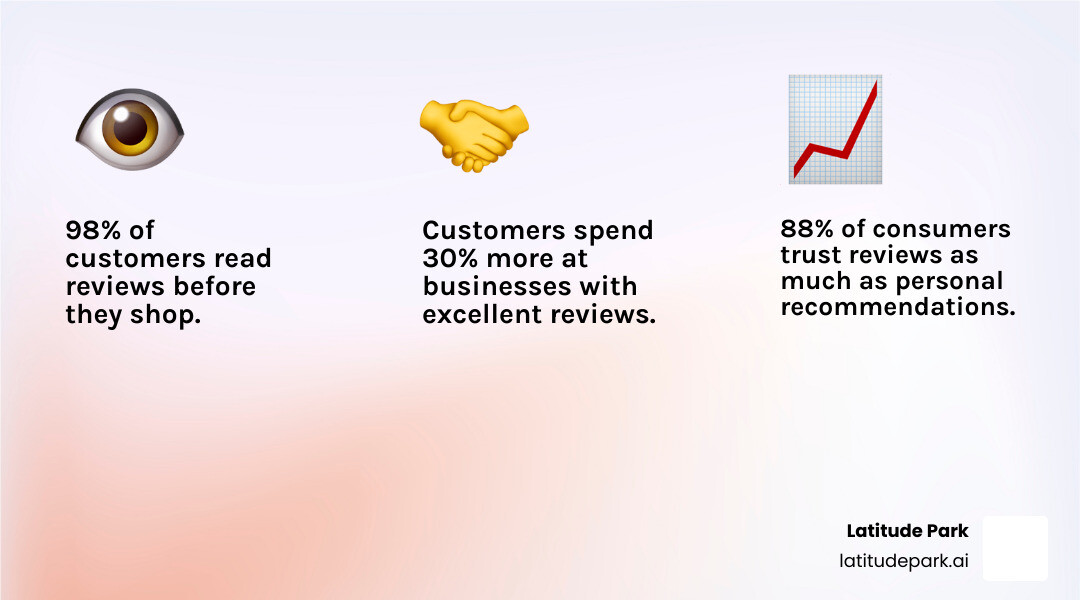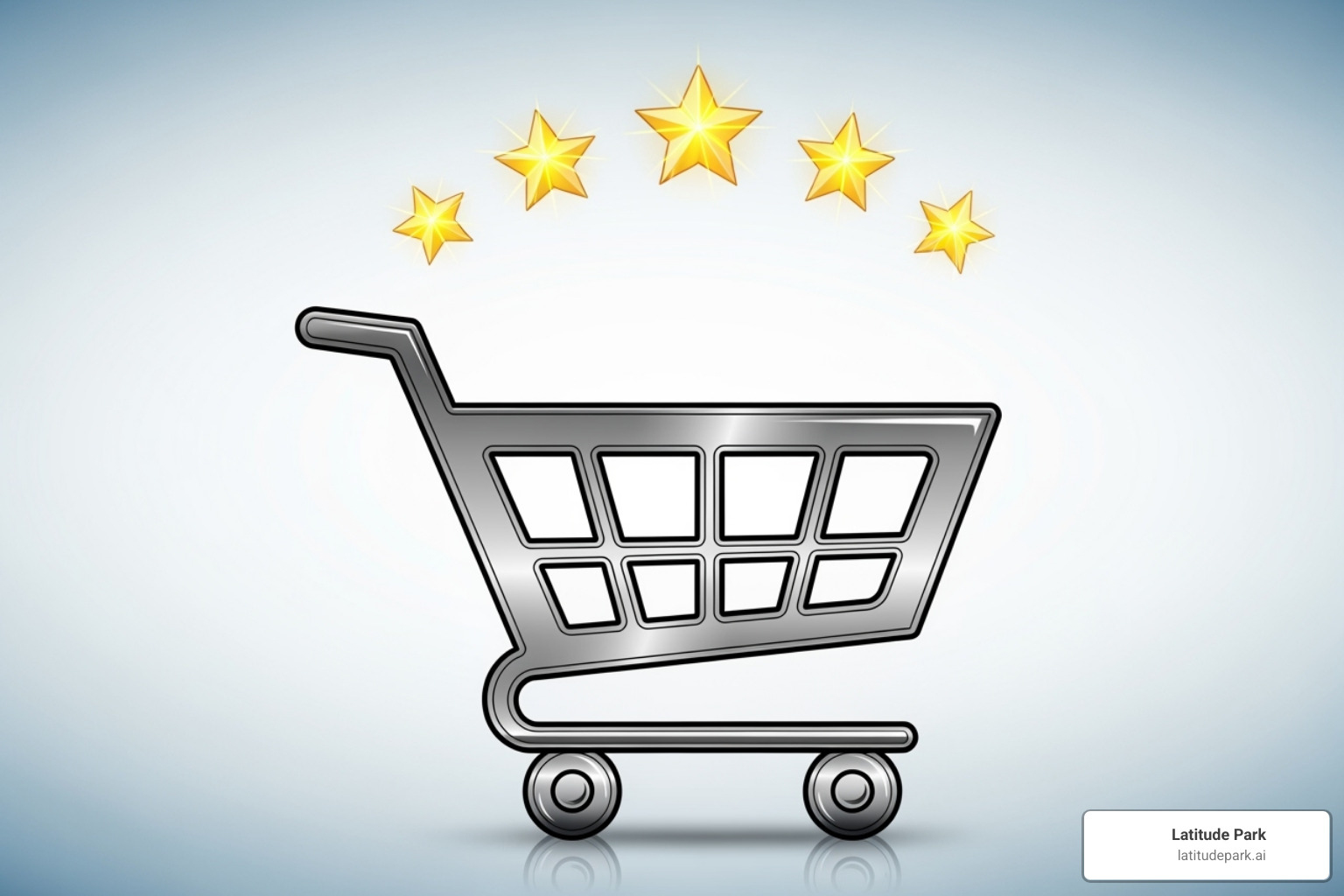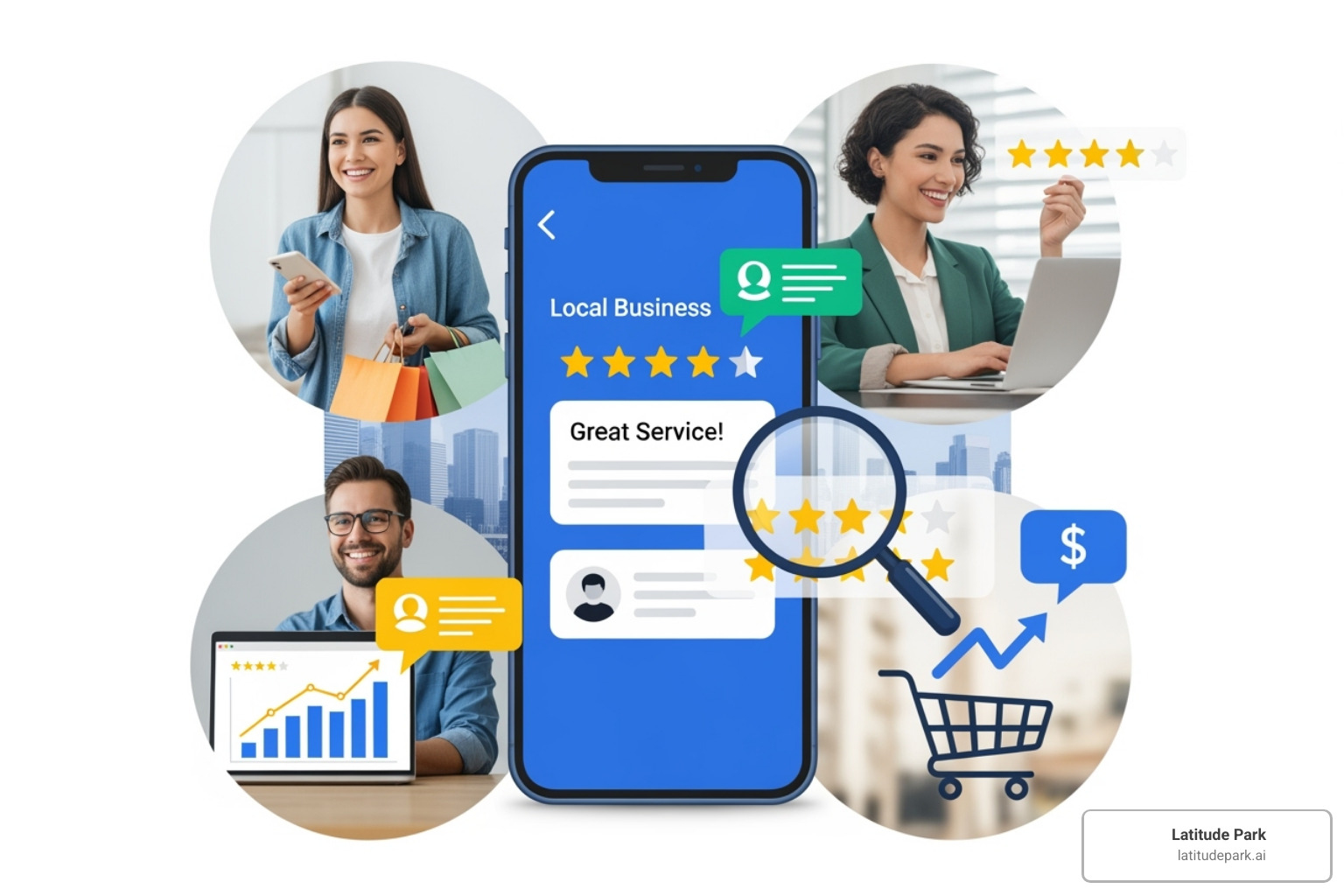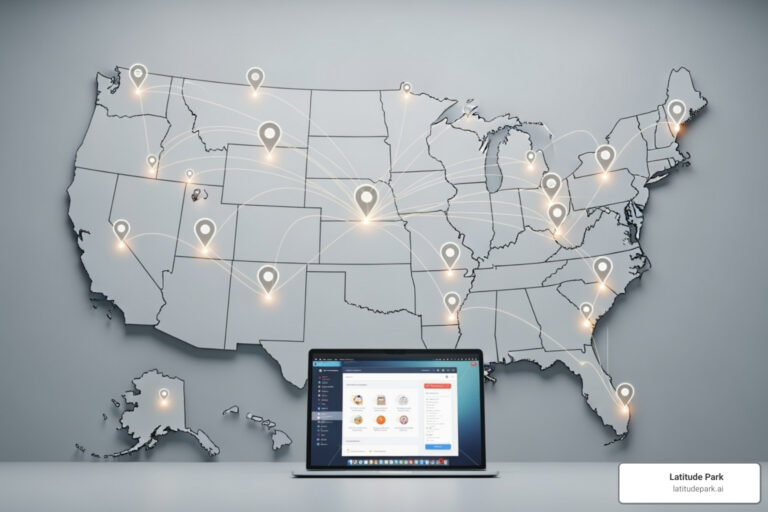Why Online Reviews Are Your Brand’s Most Powerful Marketing Tool
What are the benefits of online reviews for your business? They provide powerful advantages, from increasing sales and building trust to boosting search engine visibility and offering valuable customer insights. Reviews act as digital word-of-mouth, creating social proof that drives real results. For example, customers spend 30% more at businesses with excellent reviews, and a higher star rating can increase clicks from search results by 25%.
The numbers tell a compelling story. Ninety-eight percent of customers read reviews before they shop, and these digital recommendations now influence trillions in revenue worldwide. For franchise marketing managers, using this feedback is critical for maintaining a consistent brand reputation across all locations.
Think about your own shopping habits. When choosing a restaurant on Google Maps or a product on Amazon, you likely check the star rating and reviews first. Your customers do the same when evaluating your business. Reviews are not just for attracting new customers; they reshape how businesses operate, improve, and connect with their audience. They are the cornerstone of a modern digital marketing strategy.
I’m Rusty Rich, President and founder of Latitude Park. With over 15 years of experience in digital marketing, I’ve seen what are the benefits of online reviews for franchises and multi-location businesses. Let’s explore how this feedback revolution can transform your brand’s growth.

The Foundation of Trust: How Reviews Drive Sales and Credibility

What are the benefits of online reviews goes far beyond collecting feedback. Reviews are the backbone of modern business trust, directly driving sales and building credibility.
From a customer’s perspective, they aren’t just looking at your website; they’re scrolling to star ratings to see what real people say. This behavior is backed by data: 93% of local consumers use reviews to determine if a local business is good or bad, and 72% of customers won’t take action until they’ve read reviews. A weak review presence means you’re invisible to most potential customers.
Here’s where it impacts your bottom line: a one-star improvement in online ratings can lead to a significant boost in sales—often a 5% to 9% increase in revenue. Overall, online reviews drive an average of 18% sales uplift. Conversely, a single negative review can cost thousands in lost annual sales, as 60% of consumers say negative reviews made them not want to use a business.
For franchise marketing managers, each location’s performance impacts the entire brand. Understanding the 6 Keys to a Positive Online Presence & Reputation helps build a consistent strategy.
Building Credibility with Social Proof
We are hardwired to trust the experiences of others, a phenomenon called social proof. This is incredibly powerful when it plays out through customer reviews.
A staggering 88% of consumers trust user reviews as much as personal recommendations from family and friends. A review from a stranger carries the same weight as advice from someone you know. This makes reviews the ultimate form of word-of-mouth advertising. Positive feedback creates an immediate sense of authenticity that traditional ads can’t match. It’s real people sharing real experiences, which resonates with today’s consumers.
This social proof works 24/7, building consumer trust and shaping brand perception even while you sleep. Each review is a mini-testimonial converting browsers into buyers. For a deeper dive into the psychology behind this, see Are Online Reviews Important? Yes, and Here’s Why.
The Direct Financial Impact of Your Star Rating
Your star rating is a direct predictor of revenue growth and customer spending. The connection is straightforward and powerful.
Customers tend to spend 30% more money at businesses with “excellent” reviews. This isn’t just about attracting more customers; it’s about them being willing to spend more once they choose you. Positive reviews create a premium perception that translates to higher transaction values.
Review volume also matters. Products with at least five quality reviews have a 270% higher chance of being purchased compared to those with fewer. This shows that even a small number of quality reviews can dramatically impact sales.
Interestingly, perfect 5-star ratings aren’t always the most trusted. A 4.0 to 4.5 star rating is often the most trusted because it suggests authenticity. The threshold for action is clear: 49% of consumers need at least a four-star rating before they’ll use a company, and 94% of all purchases are made for products with an average rating of 4 stars and above. Maintaining a healthy average rating is essential for staying competitive.
What are the benefits of online reviews for SEO and Visibility?

What are the benefits of online reviews for your search engine visibility? The impact is massive. Think of reviews as your secret weapon for local search dominance. Google pays close attention to what customers say about you. In fact, customer reviews rank as the third most important factor for local search, heavily influencing whether your business appears in the coveted Google Local Pack.
With 81% of people now using Google to find business reviews, it has become the primary destination for local business information. Optimizing your review strategy isn’t just about reputation—it’s about actively improving your SEO performance. For franchise managers, each location’s review profile impacts its local visibility, making a comprehensive strategy essential. Our Google Reviews Management Guide dives deeper into these tactics.
Climbing the Ranks in Local Search
Google’s algorithm loves fresh, authentic content, which customer reviews provide. When customers write reviews, they naturally include keywords related to your services and location, creating a steady stream of user-generated content that search engines index.
Your star rating and review volume directly influence your Map Pack visibility. Going from a 3-star rating to a 5-star rating gets a business 25 percent more clicks from the Google Local Pack. This is a game-changing increase in visibility.
Google’s algorithm recognizes reviews as trust signals. Consistent, positive feedback tells Google your business provides value and should be shown to more searchers. This fresh content keeps your business profile active and relevant, which search engines reward with better rankings. A proactive system is crucial, which is why understanding the Proactive Online Review Strategy: Importance can make a huge difference.
Expanding Your Digital Footprint
Reviews don’t just help you rank on Google; they expand your entire digital presence. Every review on Google, Facebook, Yelp, or industry-specific sites adds to your online authority. This multi-channel presence ensures potential customers find positive information about you wherever they search.
Search engines use E-A-T (Expertise, Authoritativeness, Trustworthiness) to evaluate businesses, and reviews are a major factor. Consistent positive feedback across multiple platforms signals that your business is legitimate and valuable. Since 76% of consumers trust peer content more than brand content, search engine authority increasingly depends on authentic customer feedback. This expanded footprint requires understanding how different platforms work together, a relationship we explore in our guide on Reviews & Reputation.
From Feedback to Forte: Using Reviews to Improve Your Business

While most businesses focus on collecting positive reviews for marketing, the smartest operators know what are the benefits of online reviews extend far beyond social proof. Your customer feedback is a goldmine of free market research waiting to transform your operations.
Every review is a customer report on their experience—what worked, what didn’t, and how to fix it. It’s like having a team of mystery shoppers providing ongoing intelligence. I’ve seen franchise owners turn around underperforming locations by paying attention to reviews. When customers consistently mention slow service at one location but praise friendly staff at another, you have actionable data for real improvements.
This feedback comes directly from your paying customers, no expensive surveys needed. This approach is part of what we explore in Mastering Social Listening: Latitude Park.
Uncovering Actionable Customer Intelligence
Treating reviews as customer intelligence helps you see patterns that reveal deeper operational issues. For example, a restaurant franchise I worked with received complaints about a confusing ordering process. The owner finded the issue wasn’t the menu but inconsistent staff training. By revamping their training program, they saw immediate improvements in service and review ratings.
By looking beyond individual complaints to spot systemic issues, you can identify weaknesses and address root causes. This proactive approach to service recovery often surprises customers who see their feedback implemented. For service-based businesses, these insights are even more critical, a concept we explore in Patient Reviews: The Marketing Secret for Medical Practices.
What are the benefits of online reviews when responding to customers?
Responding to reviews is a powerful tool for customer engagement and building loyalty. When you respond thoughtfully, you’re having a public conversation that all future customers will read. A Harvard Business Review study found that businesses responding to reviews consistently see better overall ratings. Hotels that engaged with reviews saw a 12% increase in review volume and higher ratings.
The numbers are compelling: responding to reviews can increase conversion rates by 144%. When potential customers see you care enough to respond, it changes their perception of your brand. Your responses should showcase your brand personality authentically; generic replies don’t build trust.
The real magic happens when you respond to negative reviews with grace. I’ve seen businesses flip their reputation by demonstrating they listen, care, and take action. It shows potential customers that if something goes wrong, you’ll make it right. This engagement creates a feedback loop that benefits everyone, which is why mastering review management is so crucial, as detailed in How to Manage Online Reviews.
A Practical Guide to Mastering Your Online Reputation

Now that we’ve explored what are the benefits of online reviews, let’s get practical. Mastering your online reputation requires a proactive approach focused on three areas: encouraging reviews, managing key platforms, and responding thoughtfully. As we discuss in Why You Should Always Encourage User Reviews, taking an active role is essential for long-term success.
Where to Focus Your Efforts: The Most Important Review Platforms
Focus your energy on the platforms that matter most to your customers.
- Google Business Profile: This should be your top priority. A whopping 81% of people use Google for business reviews, making it the champion of review platforms and crucial for local SEO.
- Facebook: With over 85 million reviews, it integrates seamlessly with your social media strategy.
- Yelp: This remains a go-to for local service businesses like restaurants and salons. 98% of Yelp users make a purchase at a business they find on the platform.
- Amazon: Non-negotiable for e-commerce, hosting over 85 million reviews.
- Industry-Specific Platforms: Don’t overlook sites like TripAdvisor for hospitality, Capterra or G2 for B2B software, and Angi for home services. The Better Business Bureau and Trustpilot also help establish credibility.
Understanding What to Look For in the Best Business Review Sites can help you prioritize your efforts.
How to Encourage a Steady Stream of Positive Reviews
Getting customers to leave reviews doesn’t have to be complicated. The key is to make it easy and ask at the right moment.
- The direct ask: Train your team to simply say, “If you had a great experience, we’d appreciate a quick review on Google.”
- Post-purchase follow-up: Use email or SMS automation to ask for a review a few days after the purchase, while the experience is still fresh.
- QR codes and NFC tap cards: For physical locations, print QR codes on receipts or use NFC tap cards to direct customers instantly to your review page.
- Smart incentives: Offer a small discount or entry into a drawing for leaving any review, not just positive ones. Always check platform guidelines first.
The secret is to make the process ridiculously simple. Provide direct links and remove any friction. For platform-specific strategies, check out How to Manage Reviews on Facebook.
What are the benefits of online reviews when crafting the perfect response?
How you respond can be more powerful than the original review. For positive reviews, be genuine and personal. Thank the customer by name and mention something specific they said.
Negative review responses are where you can really shine. Potential customers are watching how you handle criticism. Respond quickly to show you care. Apologize for their negative experience, acknowledge their concerns, and offer a real solution, taking the conversation offline if needed.
Stay professional and transparent. A well-crafted response to a negative review can do more for your reputation than a dozen positive ones because it demonstrates integrity. You’re not just responding to one customer; you’re showing hundreds of potential customers how your business handles problems. This approach is part of a broader strategy we cover in Effective Strategies: Building & Managing Brand Online Reputation.
Frequently Asked Questions about the Benefits of Online Reviews
Business owners often have specific questions about what are the benefits of online reviews, particularly regarding review volume, ratings, and handling fake feedback. Here are the most common concerns.
How many reviews does a business need?
The good news is you don’t need hundreds of reviews to see benefits. Research shows a clear trust threshold that is surprisingly achievable. Having just five reviews increases the probability that a product will sell by 270% compared to products with none. This number represents a critical turning point where customers begin to trust your business.
Beyond those initial five, consumers typically read around 10 reviews before making a decision. A steady stream of new reviews signals reliability to both customers and search engines, so while five gets you started, ongoing accumulation should be your goal.
What is considered a good star rating?
A perfect 5-star rating isn’t always best. Savvy consumers know no business is perfect and can be suspicious of flawless ratings. The sweet spot for building trust is a 4.0 to 4.5 star rating, which is the most trusted range according to consumer studies. This range balances excellence with authenticity.
The numbers back this up: 49% of consumers need at least a four-star rating before considering a company, and 94% of purchases happen with businesses rated 4 stars or above. Don’t panic over an occasional 3 or 4-star review; it might actually help your credibility.
How should a business handle fake or malicious reviews?
Dealing with fake reviews is frustrating but requires a strategic, not emotional, response. Getting defensive can make the situation worse.
First, report the review to the platform. Google, Yelp, and others have policies against fake content. Provide clear evidence and be patient, as the removal process can take time.
If the review isn’t removed, consider a brief, professional public response. For example: “We have no record of this customer experience, and it doesn’t reflect our service standards. We welcome the opportunity to discuss any legitimate concerns directly.” This shows other customers you’re addressing the issue without validating false claims.
The most effective long-term strategy is to drown out fake reviews with authentic positive ones. When you have dozens of genuine reviews, a few fake ones become less impactful. For severe cases of harassment or defamation, consult legal professionals.
Conclusion
The review revolution is here, and the evidence is overwhelming. What are the benefits of online reviews? They are transformative. From building the trust that drives customers to spend 30% more, to boosting local search rankings and providing actionable customer insights, online reviews are the backbone of modern business success.
We’ve seen how reviews act as digital word-of-mouth, with 88% of consumers trusting them as much as personal recommendations. We’ve learned how they can increase clicks from search results by 25% and how feedback can drive real operational improvements. With 98% of customers reading reviews before they shop, a strong review presence isn’t optional—it’s essential.
For multi-location businesses like franchises, managing this feedback across all locations is crucial. Each location represents your brand, and consistency in review management is critical for protecting and growing your brand’s reputation.
At Latitude Park, we’ve seen businesses that accept proactive review management thrive. They turn feedback into a competitive advantage and satisfied customers into brand advocates. The choice is yours: let your reputation develop randomly, or take control. Don’t become invisible to the 98% of customers who rely on reviews.
Learn how a robust reputation management strategy can transform your brand and turn the review revolution into your greatest competitive advantage. Your customers are already talking—make sure you’re part of the conversation.









